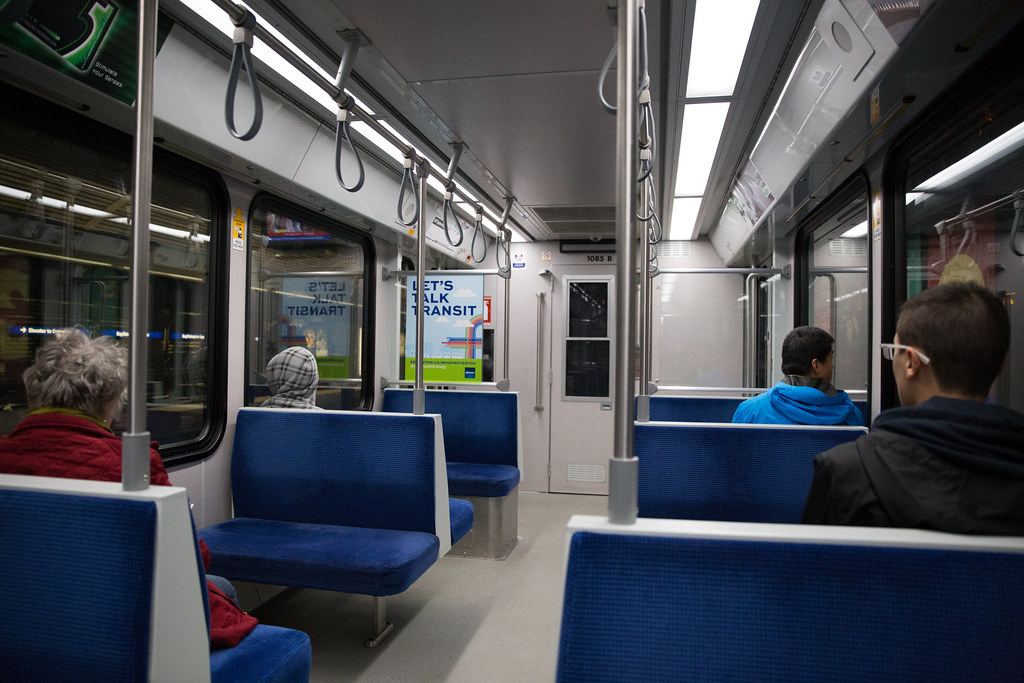Edmonton's transit ridership has reached 69% of pre-pandemic levels, a recovery that is outpacing Toronto's and is on par with Vancouver's, says Carrie Hotton-MacDonald, branch manager for the Edmonton Transit Service.
"I did assume that urban, dense environments would recover much more quickly than we would, but it hasn't been the case," she told Episode 170 of Speaking Municipally, Taproot's civic affairs podcast.
She noted that even during the pandemic, ridership was around 50% of normal, indicating perhaps that a significant number of Edmontonians could not work remotely and continued to ride the bus or take the train.
Rebuilding and then growing ridership relates in part to how safe people feel when taking transit. The number of security incidents per 100,000 boardings has been decreasing since October, Hotton-MacDonald said, but she acknowledged that "doesn't bring a lot of comfort for those that feel like maybe it's not as safe as it could be."
Homelessness and the drug poisoning crisis contribute to social disorder in transit stations. City council approved $3.9 million at the end of February to add more staff to the Community Outreach Transit Team, where members of the Bent Arrow Traditional Healing Society and transit peace officers connect people seeking shelter in the transit system with the supports they need.
But ultimately, it's the root causes that need addressing, Hotton-MacDonald said.
"We need to find sheltering solutions for people, because to think of a cold concrete floor in a pedway or transit centre as being appropriate shelters, it's really heartbreaking," she said. "They deserve better, and they need more support than that. That's what's keeping me up at night, to be honest with you."
The Edmonton Police Association has not hesitated to draw attention to violent crime in the transit system. Hotton-MacDonald said she has a good working relationship with the Edmonton Police Service on this file. "But I will say that when we hear about those stories, the first thing that comes to my mind is, 'Well, what is your plan for addressing the crime that's happening in those spaces then?'"

Transit ridership is recovering to pre-pandemic levels faster in Edmonton than in some bigger, denser cities, says Carrie Hotton-MacDonald, branch manager for the Edmonton Transit Service. (Mack Male/Flickr)
Measures to keep riders safe from COVID-19 are also likely to draw some Edmontonians back to the bus. The provincial mask mandate for transit remains in place for now, and city council is considering an extension. Hotton-MacDonald said the Edmonton Transit Service advisory board has told her it would like the mandate to stay a bit longer.
"I think we do need at some point to think about what off-boarding looks like," she said. "But I would want to do that with the community and not just unilaterally making the decision."
Ultraviolet air purification technology will be installed on buses and trains starting in the fall, she noted. And that's not the only new technology on its way — the long-awaited Arc card electronic fare payment system will be in widespread use, just a little later than previously predicted. Hotton-MacDonald said Edmonton will be the first smart-fare-using city in Canada to have fare-capping, so that if you take a lot of trips in one day, there's a limit on what you'll have to pay.
Soaring gas prices may also prompt commuters to return to transit. "We have a really great frequent transit network," she said. "I use transit to get to and from work, and I'm looking around at people who are choosing transit with me, and you know, I want to high-five them."
Hotton-MacDonald added that the bus network redesign has seen more than 60 adjustments since it was launched almost a year ago. A report on expansion opportunities is slated to be presented to executive committee on March 23.
Hear more about the redesign, as well as her relief about funding from the federal and provincial governments to fill the revenue gap created by the pandemic and her thoughts on the Edmonton Metropolitan Transit Services Commission — it's all on the March 18 episode, available wherever you get your podcasts.
